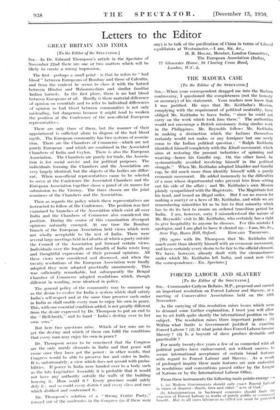THE MADURA CASE
[To the Editor of the SPECTATOR.] Sin,—When your correspondent dragged me into the Madura controversy, I questioned the completeness (not the honesty or accuracy) of his statement. Your readers now know that I was justified. He says that Mr. Keithahn's Mission, complying with the requirement of political neutrality, have obliged Mr. Keithahn to leave India, '' since he could not carry on the work which took him there." The authorities would not encourage a British missionary doing similar work in the Philippines. Mr. Reynolds follows Mr. Keithalm in making a distinction which the Indians themselves certainly would not make, or any foreigner but one newly come to the Indian political question : " Ralph Keithahn identified himself completely with the Khadi movement, which aims at restoring the peasant industries of spinning and weaving—hence his Gandhi cap. On the other hand, he systematically avoided involving himself in the political struggle." When Mr. Keithahn adopted kharlder and Gandhi cap, he did much more than identify himself with a purely economic movement. He added inunensely to the dillieulties of a man whose departmental rules prevent him from setting out his side of the affair ;. and Mr. Keithalm's own Mission plainly sympathized with the Magistrate. The Magistrate lost his head, and issued an illegal order. But I see no reason for making a martyr or a hero of Mr. Keithahn, and while we are remembering minorities let us be fair to that minority which has to do its best to ensure an ordered transition period for India. I am, however, sorry I misunderstood the nature of Mr. Reynolds' visit to Mr. Keithahn, who certainly has a right to give hospitality to anyone he chooses. For this mistake I apologise, and I am glad to have it cleared up.—I am, Sir, &c., Scar Top, Boars Hill, Oxford. EDWARD THOMPSON.
[We agree with Dr. Thompson that Mr. Keithalin did much more than identify himself with an economic movement, and have certainly every desire to be fair to the official element. We have, however, already dealt with the circumstances under which Mr. Keithahn left India, and must now close the correspondence.—En. Spectator.]














































 Previous page
Previous page